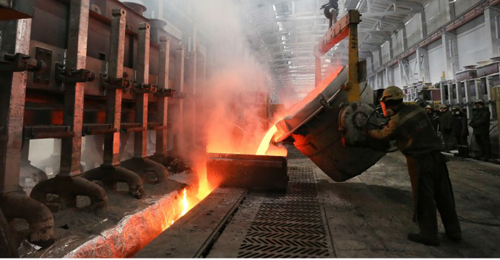
Recently, China Hongqiao came under attack from short-seller Emerson Analytics, which alleged in a research report that Hongqiao had under-reported the cost of its self-generated power and alumina and that the share price should be worth only HK$3.1...

China Hongqiao says it has overtaken Russia's RUSAL as the world’s largest aluminum producer. Photo: Bloomberg
The stock trading link with Shanghai and Shenzhen has brought tremendous benefits to the Hong Kong stock market.
China Hongqiao Group Ltd. (01378.HK), for example, has defeated a short-seller as capital flowed from southbound cross-border stock trading.
The world’s largest aluminum smelter was founded by Zhang Shiping, a textile entrepreneur and the boss of Weiqiao Textile Co. Ltd. (02698.HK).
China Hongqiao started in the production and distribution of jeans and yarn-dyed denims, but shifted to aluminum production in 2006.
It said it has overtaken Russia’s United Company RUSAL (00486.HK) as the world’s largest aluminum producer since 2011.
China Hongqiao produced 2.7 million metric tons of aluminum in the first half of last year, while RUSAL reported an output of 3.68 million tons for the whole of 2016.
China Hongqiao has a market value of HK$51.6 billion, based on the stock’s closing price last Friday.
Zhang is ranked the 16th richest man in China this year, with a personal wealth of 61 billion yuan (US$8.83 billion).
That is above the rankings of fellow Chinese billionaires Guo Guangchang of Fosun International Ltd. (00656.HK) and Liu Yonghao of New Hope Group.
Recently, China Hongqiao came under attack from short-seller Emerson Analytics, which alleged in a research report that Hongqiao had under-reported the cost of its self-generated power and alumina and that the share price should be worth only HK$3.1, or 60 percent lower than its level when the report was published.
Hongqiao’s share price slumped nearly 10 percent on March 1, when the short-seller published the report.
However, the stock was suspended from trading immediately, and China Hongqiao issued a statement saying “allegations and information contained in the allegation report are biasedly selected, materially misleading, untrue and unfounded”.
The company said it was preparing a detailed clarification announcement to refute the allegations, which would be released “as soon as practicable”.
The detailed response has yet to be published, but the share price has already started to pick up since resuming trading on March 7.
It closed at HK$7.11 on March 10, marking a rise of over 4 percent year-to-date.
Emerson Analytics has a good track record when it comes to attacking Hong Kong-listed companies.
Its targets in recent years included Hua Han Health Industry (00687.HK), China Fiber Optic Network System (03777.HK) and Sound Global (00967.HK).
The share prices of these three firms have plunged since the negative reports against them were published. The shares have yet to resume trading.
But the short-seller was less lucky with China Hongqiao.
Since the stock resumed trading on March 7, we’ve seen massive buying into the shares by mainland investors.
On March 7 alone, mainland investors bought over HK$200 million of the company’s shares through southbound trading, and that represented just a third of the trading volume for that day.
In fact, as of March 10, mainland investors already hold 8.32 percent of the company’s shares through southbound trading links, based on data from the Central Clearing and Settlement System.
Zhang’s family, on the other hand, holds 81.1 percent.
That means only about 10 percent of the floating stocks are available for trading. Local and foreign investors may only have around 5 percent as some mainland investors have bought the shares directly through Hong Kong accounts.
As a result, the company has ample ammunition to support its share price.
Short-sellers should learn a hard lesson from this case and select targets more carefully in the future.
More importantly, they should consider publishing their reports in simplified Chinese so that mainland investors could easily understand them.